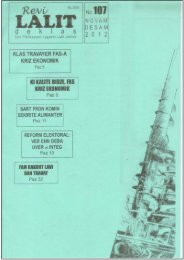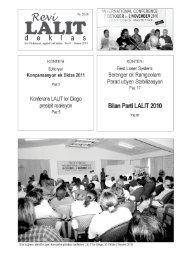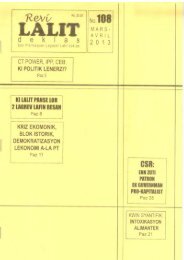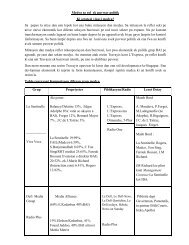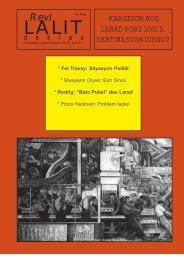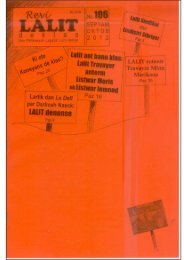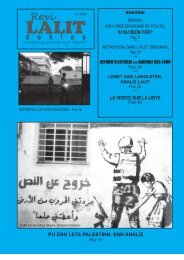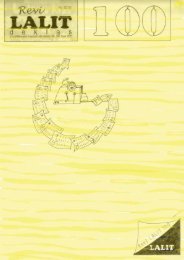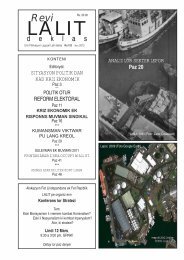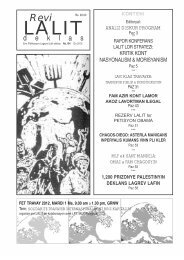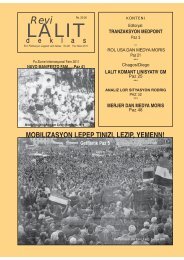Against communalism of the best-loser system - Lalit Mauritius
Against communalism of the best-loser system - Lalit Mauritius
Against communalism of the best-loser system - Lalit Mauritius
You also want an ePaper? Increase the reach of your titles
YUMPU automatically turns print PDFs into web optimized ePapers that Google loves.
<strong>system</strong>. At <strong>the</strong> time <strong>the</strong> Constitution was drafted and promulgated it was not envisaged that some people<br />
would be against <strong>the</strong> <strong>best</strong> <strong>loser</strong> <strong>system</strong> and that candidates at general elections would even refuse to<br />
participate in lhe exercise <strong>of</strong> allocation. It was <strong>the</strong>n believed that all Mauritians would be interested in<br />
preserving <strong>the</strong> <strong>best</strong> <strong>loser</strong> <strong>system</strong>. However with <strong>the</strong> passage <strong>of</strong> time, many Mauritians have come to feel<br />
that it is not necessary that <strong>the</strong>y should be divided into different communities. The Constitution does not<br />
cater for a situation where candidates wish to stand for election, but reject <strong>the</strong> <strong>best</strong> <strong>loser</strong> <strong>system</strong>. When <strong>the</strong><br />
Constitution was amended in 1983, paragraph 4(8) <strong>of</strong> <strong>the</strong> First Schedule was made to apply <strong>the</strong> 1972<br />
<strong>of</strong>ficial census for <strong>the</strong> exercise <strong>of</strong> <strong>the</strong> allocation <strong>of</strong> <strong>best</strong> <strong>loser</strong> seats. It was not deemed fit at that time to<br />
abolish <strong>the</strong> <strong>best</strong> <strong>loser</strong> <strong>system</strong>. The fact that <strong>the</strong> exercise in <strong>the</strong> year 2000 will apply <strong>the</strong> figures <strong>of</strong> <strong>the</strong> 1972<br />
Census creates a situation which may not reflect reality, but this cannot be an additional reason to oppose<br />
<strong>the</strong> <strong>best</strong> <strong>loser</strong> <strong>system</strong> and for refusing to declare <strong>the</strong> community to which one belongs. The Constitution is<br />
our Supreme law and we are compelled to obey it. In <strong>the</strong> recent case <strong>of</strong> Joomun v. Government <strong>of</strong><br />
<strong>Mauritius</strong> 2000 SCJ 234 <strong>the</strong> Supreme Court has held that Mauritians cannot be compelled to declare to<br />
which community <strong>the</strong>y belong in <strong>the</strong> Year 2000 census form. The Court is not in a position to go against<br />
<strong>the</strong> provisions <strong>of</strong> <strong>the</strong> Constitution, but must apply <strong>the</strong>m when <strong>the</strong>y are clear and unambiguous.<br />
The body <strong>of</strong> our Constitution does not refer to communities. It would appear that <strong>the</strong> First Schedule<br />
comes as an addendum or as an afterthought to introduce <strong>the</strong> concept. Representations were made by<br />
minorities to secure <strong>the</strong>ir fair and adequate representation in <strong>the</strong> Assembly (See <strong>the</strong> <strong>Mauritius</strong><br />
Constitutional Conference Report 1965 and an account <strong>of</strong> <strong>the</strong> setting up <strong>of</strong> <strong>the</strong> <strong>best</strong> <strong>loser</strong> <strong>system</strong> proposed<br />
in <strong>the</strong> Stonehouse Report in <strong>the</strong> case <strong>of</strong> Ex p. Electoral Supervisory Commission and Ors 1991 MR 166).<br />
Paragraph 3(4) <strong>of</strong> <strong>the</strong> First Schedule reads as follows<br />
“For <strong>the</strong> purpose <strong>of</strong> this Schedule, <strong>the</strong> population <strong>of</strong> <strong>Mauritius</strong> shall be regarded as including a Hindu<br />
community, a Muslim community and a Sino-Mauritian community, and every person who does not<br />
appear, from his way <strong>of</strong> life, to belong to one or o<strong>the</strong>r <strong>of</strong> those 3 communities shall be regarded as<br />
belonging to <strong>the</strong> General Population, which shall itself be regarded as a fourth community. “(underlining<br />
is ours).<br />
We note that nei<strong>the</strong>r in section 3 nor in section 16 <strong>of</strong> <strong>the</strong> Constitution, referring to fundamental rights and<br />
protection from discriminalion, is <strong>the</strong> word “community” used. The relevant words used <strong>the</strong>re are “race,<br />
place <strong>of</strong> origin, colour, creed and caste”. Section 11 which addresses <strong>the</strong> freedom <strong>of</strong> conscience first uses<br />
<strong>the</strong> word “community” in <strong>the</strong> context <strong>of</strong> “community with o<strong>the</strong>rs”. It fur<strong>the</strong>r uses <strong>the</strong> term “religious<br />
community” in subsection (3). Now it has been contended that “community” in <strong>the</strong> Schedule means<br />
community according to one's religion. I am not <strong>of</strong> <strong>the</strong> view that this is correct as a Sino-Mauritian may<br />
be a Buddhist or a Christian (or a Mauritian whose ancestors are <strong>of</strong> Indian origin may be a Catholic).<br />
Nowhere is it mentioned in <strong>the</strong> Schedule that “appropriate community” means <strong>the</strong> “religious community”<br />
mentioned in Section 11 <strong>of</strong> <strong>the</strong> Constitution. There may be dozens <strong>of</strong> religious communities in <strong>Mauritius</strong><br />
but <strong>the</strong>re are only 4 appropriate communities. What paragraph 3(4) <strong>of</strong> <strong>the</strong> Schedule purports to do is to<br />
divide Mauritians into Communities only “for <strong>the</strong> purposes <strong>of</strong> this Schedule”.<br />
The First Schedule does not say that <strong>the</strong> candidates who obtain <strong>the</strong> <strong>best</strong> <strong>loser</strong> seats must only represent <strong>the</strong><br />
interests <strong>of</strong> <strong>the</strong> community to which <strong>the</strong>y belong when <strong>the</strong>y sit in <strong>the</strong> Assembly.<br />
Now since paragraph 3(4) <strong>of</strong> <strong>the</strong> First Schedule purports to divide <strong>the</strong> population into communities only<br />
for <strong>the</strong> purposes <strong>of</strong> <strong>the</strong> Schedule, this restricts <strong>the</strong> task <strong>of</strong> <strong>the</strong> Judge in proceedings questioning <strong>the</strong><br />
correctness <strong>of</strong> <strong>the</strong> declaration relating to community to deciding this fact solely for <strong>the</strong> allocation for <strong>the</strong><br />
<strong>best</strong> <strong>loser</strong> seats and not for any o<strong>the</strong>r purpose.<br />
After having made those preliminary remarks I shall attempt to carry out <strong>the</strong> exercise to see to which<br />
community <strong>the</strong> Respondents belong. For <strong>the</strong> purposes <strong>of</strong> <strong>the</strong> First Schedule <strong>the</strong>re are initially three<br />
communities - Hindu, Muslim and Sino-Mauritian. Then <strong>the</strong>re is a fourth community to which all o<strong>the</strong>r<br />
Mauritians belong, if <strong>the</strong>y do not appear from <strong>the</strong>ir way <strong>of</strong> life to belong to <strong>the</strong> first three communities.<br />
The General Population is this fourth community and no reference at all is made to religion in this<br />
context. The General Population becomes a residual category, which consists <strong>of</strong> all those whose way <strong>of</strong><br />
life shows that <strong>the</strong>y do not belong to <strong>the</strong> first three communities.<br />
Way <strong>of</strong> life may depend on a series <strong>of</strong> factors - <strong>the</strong> way one dresses, <strong>the</strong> food one eats, <strong>the</strong> religion one<br />
practises, <strong>the</strong> music one listens to, <strong>the</strong> films one watches. External appearance and <strong>the</strong> name one bears are<br />
also pointers as to <strong>the</strong> community to which one may belong. The expression “way <strong>of</strong> life” used in <strong>the</strong><br />
First Schedule has never been put to <strong>the</strong> test and some 33 years after <strong>the</strong> Constitution was drafted one<br />
cannot escape <strong>the</strong> fact that a common way <strong>of</strong> Mauritian life has gradually and steadily developed in<br />
<strong>Mauritius</strong> which cuts across communal barriers. This makes it still more difficult for a judge <strong>of</strong> <strong>the</strong><br />
Supreme Court, whose decision is not subject to appeal, to determine whe<strong>the</strong>r somebody belongs to a<br />
particular community by looking at his way <strong>of</strong> life. The issue fur<strong>the</strong>r arises as to how <strong>the</strong> judge can<br />
determine <strong>the</strong> way <strong>of</strong> life <strong>of</strong> a citizen unless he becomes like Big Bro<strong>the</strong>r in H.G. Wells' novel 1984 and<br />
watches how a citizen leads his private life. One may also change one's way <strong>of</strong> life from one election to<br />
<strong>the</strong> o<strong>the</strong>r. Our attention was drawn to <strong>the</strong> fact that a way <strong>of</strong> life can also be dependent on class distinction,<br />
for a rich Hindu and a rich Sino-Mauritian may have a similar way <strong>of</strong> life, depending on <strong>the</strong>ir financial<br />
means, whereas a rich Hindu and a poor Hindu may lead altoge<strong>the</strong>r different ways <strong>of</strong> life. In <strong>the</strong> past <strong>the</strong><br />
criteria used to decide ethnical classification were <strong>the</strong> following -



